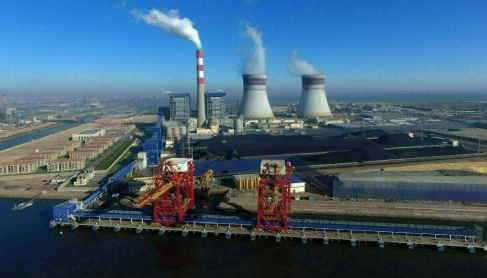ISLAMABAD: The Economic Coordination Committee (ECC) of the Cabinet has reportedly refused to extend support to the Power Division to sign side agreement with other coal-fired IPPs except Port Qasim Electric Power company (PQEPCL), insisting that the case of Sahiwal coal power plant be submitted separately, well informed sources told Business Recorder.
Sharing the details, sources said at a recent meeting of the ECC, Power Division briefed that the CPEC IPPs running on imported coal had been agitating on issues of capacity deductions and imposition of liquidated damages due to coal’s non-availability attributable to failure on part of GoP to provide necessary foreign exchange cover for procurement of imported coal, which had caused fuel shortage.
Further, these CPEC IPPs had demanded that capacity deducted should be released for such period during which the provision of necessary foreign exchange for procurement of coal was the responsibility of GoP under the Implementation Agreement. Port Qasim Electric Power company (PQEPCL) suffered non-availability for 82 days.
Imported coal-based projects: ECC okays settlement of issues with PQEPCL
Resultantly, CPPA-G deducted an amount of Rs. 21.29 billion from the capacity payment of PQEPCL. The Prime Minister office through SAPM (Coordination) on March 13, 2023 also highlighted the issue of capacity payment deduction being faced by the CPEC power projects and recommended to address the concerns meaningfully.
The matter was also deliberated during multiple meetings held under the Chairmanship of Federal Minister for PD&SI wherein Power Division was directed to submit a way forward on the associated issues.
Minister for PD&SI while chairing a meeting on issues being faced by the CPEC power projects, recommended that agreement may be negotiated on following aspects: (i) immediate stoppage of capacity payments deductions to the extent of Forex unavailability for buying coal; and (ii) settlement mechanism for the already accumulated amount on account of capacity payment deductions.
Power Division further noted that in order to resolve capacity deduction issues, both CPPA-G and PQEPCL were engaged in negotiations; under the Power Purchase Agreement, there were two treatments available to deal with such issues, which were beyond control of both parties, including Other Forced Majeure Event (OFME) and Pakistan Political Force Majeure (PPFME). CPPA-G argued that non-availability due to fuel shortage should be treated as OFME but the same was not acceptable in the event of PQEPCL.
PQEPCL position to treat such events as PPFME was not acceptable to the Government side due to wider implications and risks associated with PPFME.
However, after prolonged discussions, both parties agreed on broader principles, to find an amicable and mutually acceptable solution, accordingly, a side agreement was also initialed between CPPA-G and the PQEPCL.
The matter was further deliberated by the CPPA-G, Board of Directors and the side agreement was initialed between CPPA-G and the PQEPCL which approved the principles for settlement of the capacity deductions due to fuel shortage.
Power Division submitted following proposals for consideration and approval of the ECC of the Cabinet: (a) ECC may approve the following principles for settlement of capacity deductions due to fuel shortage and allow CPPA-G to negotiate with other CPEC power projects facing identical issues for a side agreement; (i) in case of IPPs running on imported coal, if the foreign exchange is not available the Power Purchaser shall neither deduct the Capacity Purchase Price nor impose the Liquidating Damages for the period during which the project remained unavailable due to fuel shortages;(ii) for such period the IPPs shall waive their right to claim the Return on Equity (RoE) and Cost of Working Capital (CWC) component of the Capacity Purchase Price (CPP);(iii) IPPs shall perform at the end of the PPA term for the same number of days equal to the number of days it remained non-available due to fuel shortage; (iv) during these additional days the Company shall be entitled to the Capacity Purchase Price as indexed for the last quarter of the Term and Energy Purchase Price as per terms of the PPA (a) ECC may approve the template of the side agreement and (b) ECC may authorize CPPA-G to conclude the side agreement with PQEPCL as per above principles as the company is the first which has faced the capacity deductions during FY 22-23.
The forum discussed the case threadbare and enquired about availability of dispute resolution under existing contractual arrangement between the parties. It was explained that under the Power Purchase Agreement, there were two options available to deal with such issues, which were beyond control of both parties, including other Forced Majeure Event (OFME) and Pakistan Political Force Majeure (PPFME). In the case of formal dispute, mechanism of LCIA had also been provided as a legal remedy.
However, the same had not been exhausted which went in Pakistan’s favor. It was further highlighted that the issue should have been resolved between the parties so that it was not brought before the ECC.
It was noted that both the parties would have ended up in dispute and ultimately the matter would have landed in LCIA. It was stated that in a similar situation, in case of 2002 IPPs, GoP lost such a case.
It was further stated that since the matter involved financial implication, therefore it was placed before the ECC. It was further elaborated that earlier security package documents were approved by the ECC, therefore, the approval of the same forum was required which approved original PPA and IA.
The forum observed that considering the proposal being neutral in terms of financial implication for GoP, ECC may proceed ahead for PQEPCL only. It was proposed that at that moment two CPEC IPPs were facing the same issue, therefore, the forum might approve in principle, the side agreement for two projects i.e. Sahiwal Coal fired Power Project and Port Qasim Electric Power Company.
However, it was not agreed and was highlighted that at this moment there was only agreement with one IPP, ie, Port Qasim, as it was part of the summary, and therefore may be approved.
The forum, therefore, did not agree with proposed template for side agreement and agreed to proceed only with one IPP, as one-time arrangement, on the principles as agreed between the parties for settlement of capacity deductions and LDs impositions and directed Power Division to bring issue of Sahiwal Power Plant separately to the ECC.






